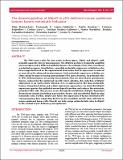Por favor, use este identificador para citar o enlazar a este item:
http://hdl.handle.net/10261/125110COMPARTIR / EXPORTAR:
 SHARE SHARE
 CORE
BASE CORE
BASE
|
|
| Visualizar otros formatos: MARC | Dublin Core | RDF | ORE | MODS | METS | DIDL | DATACITE | |

| Título: | The downregulation of ΔNp63 in p53-deficient mouse epidermal tumors favors metastatic behavior |
Autor: | Bornachea, Olga CSIC; Segrelles, Carmen; Santos, Mirentxu; Paramio, Jesús M. | Fecha de publicación: | 2015 | Editor: | Impact Journals | Citación: | Oncotarget 6(27): 24230-24245 (2015) | Resumen: | The TP63 gene codes for two major isoform types, TAp63 and ΔNp63, with probable opposite roles in tumorigenesis. The ΔNp63α protein is frequently amplified and overexpressed in different epithelial tumors. Accordingly, it has been considered a potential oncogene. Nonetheless, a possible metastatic suppressor activity has also been suggested based on the experimental observation that its expression is reduced or even absent in advanced invasive tumors. Such metastatic suppressor activities are often related to tumors bearing point mutated TP53 gene. However, its potential roles in TP53-deficient tumors are poorly characterized. Here we show that in spontaneous tumors, induced by the epidermal-specific Trp53 ablation, the reduction of ΔNp63 expression is an early event, whereas it is re-expressed in the lung metastatic lesions. Using knock down and ectopic expression approaches, we show that ΔNp63 expression opposes the epithelial-mesenchymal transition and reduces the metastatic potential of the cells. This process occurs through the modulation of ΔNp63-dependent downstream targets (including transcription factors and microRNAs) likely to play metastatic roles. Further, ΔNp63 also favors the expression of factors involved in iPS reprogramming, thus suggesting that it can also modulate specific stem cell traits in mouse epidermal tumor cells. Overall, our data assign antimetastatic roles to ΔNp63 in the context of p53 deficiency and epidermis. | Descripción: | This is an open-access article distributed under the terms of the Creative Commons Attribution License.-- et al. | Versión del editor: | http://dx.doi.org/10.18632/oncotarget.4353 | URI: | http://hdl.handle.net/10261/125110 | DOI: | 10.18632/oncotarget.4353 | Identificadores: | doi: 10.18632/oncotarget.4353 e-issn: 1949-2553 |
| Aparece en las colecciones: | (IIBM) Artículos |
Ficheros en este ítem:
| Fichero | Descripción | Tamaño | Formato | |
|---|---|---|---|---|
| p53-deficient mouse.pdf | 12,61 MB | Adobe PDF |  Visualizar/Abrir |
CORE Recommender
PubMed Central
Citations
3
checked on 30-mar-2024
SCOPUSTM
Citations
4
checked on 17-abr-2024
WEB OF SCIENCETM
Citations
4
checked on 28-feb-2024
Page view(s)
262
checked on 18-abr-2024
Download(s)
207
checked on 18-abr-2024

